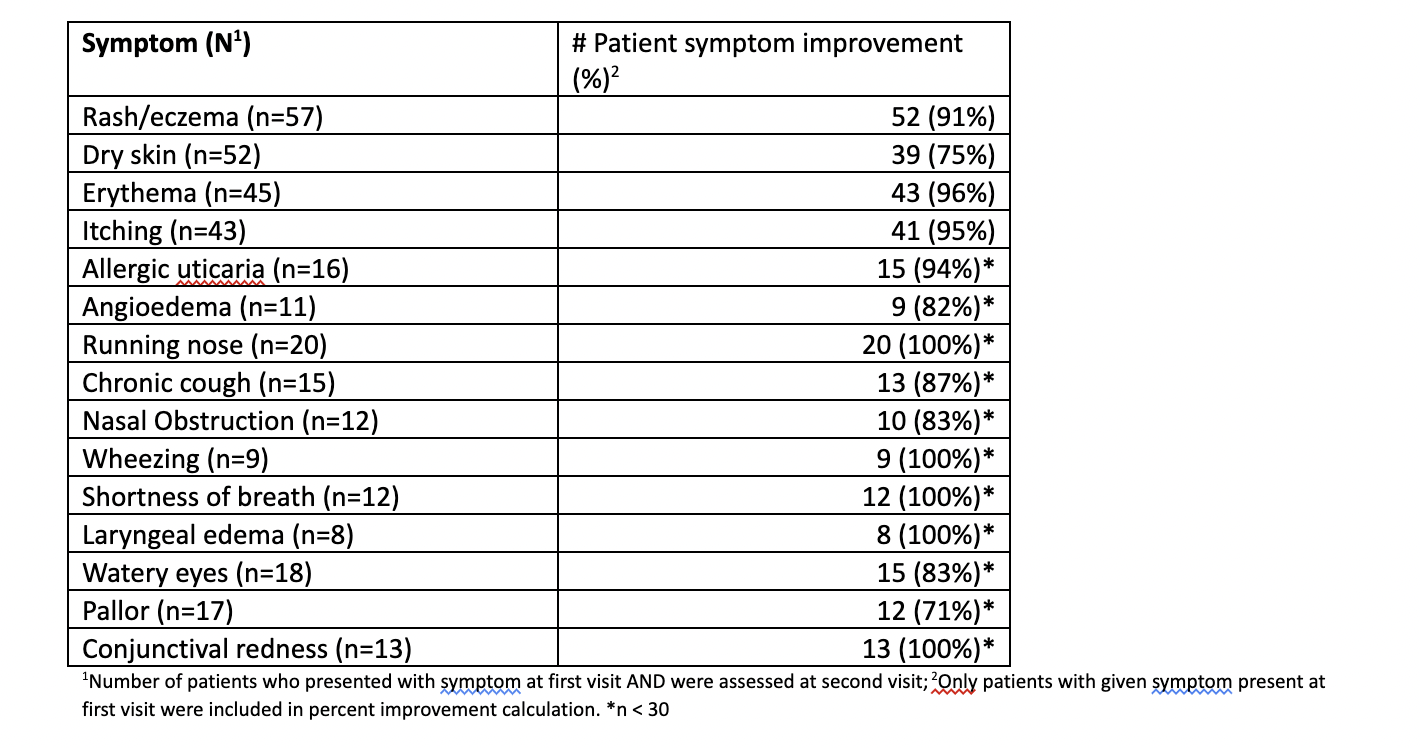Allergy, Immunology and Rheumatology
Category: Abstract Submission
Allergy, Immunology, and Rheumatology I
612 - Allergic Symptom Reduction at the Next Follow-up Visit in Infants with Suspected CMPA Treated with Amino Acid Formula: A Prospective Cohort Analysis
Saturday, April 23, 2022
3:30 PM - 6:00 PM US MT
Poster Number: 612
Publication Number: 612.200
Publication Number: 612.200
Michael J. Wilsey, USF Health Morsani College of Medicine, St. Petersburg, FL, United States; Grafton S. Barnett, Johns Hopkins All Children's Hospital, Harvest, AL, United States; Lea V. Oliveros, Johns Hopkins All Children's Hospital, Saint Petersburg, FL, United States; Kathryn M. Kimsey, Johns Hopkins All Children's Hospital, Tampa, FL, United States; Jerry M. Brown, Johns Hopkins All Children's Hospital, New port Richey, FL, United States

Jerry M. Brown, II
Student Researcher
Johns Hopkins All Children's Hospital
New port Richey, Florida, United States
Presenting Author(s)
Background: Cow’s milk protein allergy (CMPA) is a condition resulting from an intolerance to one or more cow’s milk proteins (CMPs), such as alpha-lactoalbumin & casein. CMPA is predominantly a non-IGE reaction, with patients’ generally developing symptoms within the first month of life.
Objective: Studies examining the treatment of these symptoms are scarce. We report a prospective cohort analysis involving 104 patients with suspected CMPA who were treated with amino acid formula.
Design/Methods: This is a prospective cohort analysis of de-identified survey data taken from healthcare providers treating patients with CMPA. The majority (93%) of patients were diagnosed with CMPA by clinical assessment. Patient data was collected via ZS Moments, a mobile app on an electronic device, by healthcare providers. Patients had their CMPA symptoms scored by severity from 0 to 3 at the first visit and were then started on an amino acid formula. Patients were reevaluated at next follow-up visit to assess for any changes in symptom severity and symptoms scoring was repeated. Only patients with a given symptoms at the first visit were included in percentage calculations. Patients who either discontinued or switched treatments were not included in the analysis.
Results: Results are summarized in Table 1. Most HCP's (87%) involved in the survey were general pediatricians. Of 107 patients identified, 104 (97%) were included for symptom analysis. 55% were male and 59% had a family history of atopy. Most (~3/4) were newly diagnosed with CMPA, the majority (93%) were diagnosed by clinical assessment, and ~2/3 were seen in follow-up within 3 to 5 weeks.
The most common cutaneous symptoms were itching, erythema, dry skin, and rash/eczema. 75% of patients reported improvement of dry skin and 96% reported improvement of erythema. 91% of patients presenting with rash/eczema at the first reported symptom improvement at the second visit and 95% reported reduced itching. All patients with running nose and 83% presenting with nasal obstruction reported improvement of symptoms at follow-up. Conclusion(s): This is the largest survey examining short-term allergic symptom reduction using amino acid formula to treat infants with suspected CMPA. Analysis of this cohort showed significant improvement in allergic symptoms, with the majority of patients demonstrating improvement or resolution of symptoms. This study suggests the use of amino acid formula may be effective in managing allergic symptoms of CMPA in infants.
Percentage of Patients Reporting Improvement of Allergy Symptoms at Visit 2
Objective: Studies examining the treatment of these symptoms are scarce. We report a prospective cohort analysis involving 104 patients with suspected CMPA who were treated with amino acid formula.
Design/Methods: This is a prospective cohort analysis of de-identified survey data taken from healthcare providers treating patients with CMPA. The majority (93%) of patients were diagnosed with CMPA by clinical assessment. Patient data was collected via ZS Moments, a mobile app on an electronic device, by healthcare providers. Patients had their CMPA symptoms scored by severity from 0 to 3 at the first visit and were then started on an amino acid formula. Patients were reevaluated at next follow-up visit to assess for any changes in symptom severity and symptoms scoring was repeated. Only patients with a given symptoms at the first visit were included in percentage calculations. Patients who either discontinued or switched treatments were not included in the analysis.
Results: Results are summarized in Table 1. Most HCP's (87%) involved in the survey were general pediatricians. Of 107 patients identified, 104 (97%) were included for symptom analysis. 55% were male and 59% had a family history of atopy. Most (~3/4) were newly diagnosed with CMPA, the majority (93%) were diagnosed by clinical assessment, and ~2/3 were seen in follow-up within 3 to 5 weeks.
The most common cutaneous symptoms were itching, erythema, dry skin, and rash/eczema. 75% of patients reported improvement of dry skin and 96% reported improvement of erythema. 91% of patients presenting with rash/eczema at the first reported symptom improvement at the second visit and 95% reported reduced itching. All patients with running nose and 83% presenting with nasal obstruction reported improvement of symptoms at follow-up. Conclusion(s): This is the largest survey examining short-term allergic symptom reduction using amino acid formula to treat infants with suspected CMPA. Analysis of this cohort showed significant improvement in allergic symptoms, with the majority of patients demonstrating improvement or resolution of symptoms. This study suggests the use of amino acid formula may be effective in managing allergic symptoms of CMPA in infants.
Percentage of Patients Reporting Improvement of Allergy Symptoms at Visit 2

